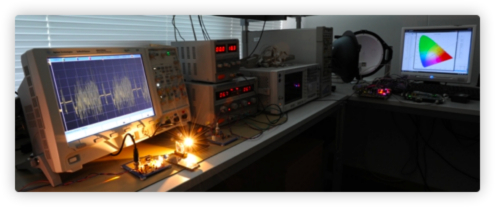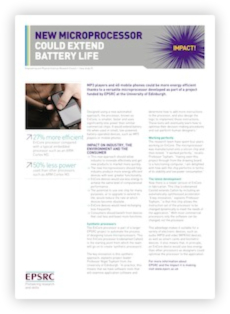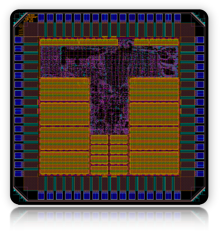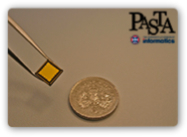News
PASTA-2 Receives £1.2m Funding from EPSRC
The Engineering and Physical Sciences Research Council has announced funding of 1.2m over three and a half years for the PASTA-2 project. PASTA-2 is a new collaboration between researchers in the School of Informatics and the School of Engineering and Electronics at Edinburgh University, led by Prof Nigel Topham.
 Joint research will shed new light on broadband communications. (Image Copyright © Peter Tuffy)
Joint research will shed new light on broadband communications. (Image Copyright © Peter Tuffy)
The overall objective of the PASTA-2 project is to investigate new and novel methods of automating the design of embedded systems to enable the timely creation of future generations of high-performance low-power digital appliances. This is an ambitious project, which brings together research in microprocessor design, software, signal processing, and an economically-important emerging application area.
"Embedded processors are an integral part of our everyday lives; from smart phones to wireless communications and bio-medical devices, future devices will require much higher performance than we have today, but their energy efficiency has to improve, as battery-life is critical".
Prof Nigel Topham
PASTA-2 Project Leader- School of Informatics at Edinburgh
Read more...
EPSRC recognises PASTA research Impact!

The Engineering and Physical Sciences Research Council (EPSRC) recognises the impact of the PASTA research group!
"MP3 players and 4G mobiles could be more energy efficient using the new EnCore microprocessor. It's smaller, faster and using 50 per cent less power than other commercial chips available, it helps extend battery life. Funded by EPSRC and developed by the University of Edinburgh, the microprocessor has been incorporated into a silicon chip and a working prototype has been tested."
Christophe Dubach receives BCS Distinguished Dissertation Award

Christophe Dubach, an RAEng/EPSRC Research Fellow at ICSA, received the BCS Distinguished Dissertation award at the 2009 BCS Roger Needham Lecture on 4 November at the Royal Society, London for his dissertation entitled: "Using Machine-Learning to Efficiently Explore the Architecture/Compiler Co-Design Space". Congratulations Christoph!
- More information about the BCS Distinguished Dissertation Award event.
PASTA Project at DEMOfest'09

The School of Informatics in Edinburgh hosted this years SICSA DEMOfest'09 where the PASTA research group presented their latest developments sourrounding the next generation EnCore Embedded Microprocessor codenamed Castle.
- More information about DEMOfest'09 event.
- More information about PASTA Research Group.
Read more...
Gadgets could go greener with high-speed computer chip

MP3 players and 4G mobile phones could be more energy efficient thanks to a new versatile microprocessor. The microprocessor, known as EnCore, delivers faster processing while using significantly less power and taking up less space than comparable devices.
Researchers at the University of Edinburgh have incorporated the microprocessor into a silicon chip, and a working prototype has been demonstrated in the laboratory. The microprocessor is configurable - meaning that it can be automatically customised for a particular application, and so is suitable for a variety of gadgets. The adaptability of the processor means that performance is not compromised by energy efficiency.
Read more...
World's first intelligent Open Source compiler

From the Wall Street Journal:
"IBM Research and European Union Provide Software Developers with Performance Gains and Faster Time-To-Market."
The "world's first intelligent Open Source compiler provides automated advice on software code optimization". Initial IBM experiments conducted on IBM System p servers achieved an average 18 percent performance improvement on embedded-application benchmarks. Congratulations to Mike O'Boyle and the MILEPOST team!
First silicon success for the PASTA Project
Today the PASTA project announced it has created a silicon implementation of the EnCore processor, and that the first sample parts are fully-functional.
"This is an important milestone for the project, as it demonstrates the research group's capability to produce working silicon from novel processor IP developed within the project. We are extremely pleased the design worked out-of-the-box in first silicon, and delighted with the chip's stability, operating frequency and low power consumption".
Prof Nigel Topham
PASTA Project Leader- School of Informatics at Edinburgh
Read more...
Full release of collarborative R&D tools
After nearly one year of developments the cTuning project released and updated all open-source collaborative R&D tools. The following provides a short summary of major improvements and changes:
- fully redesigned and documented Interactive Compilation Interface v2.0 for GCC 4.4.0 synchronized with the official plugin GCC branch - transforming compilers into plugin-enabled research toolsets
- MILEPOST GCC 4.4.0 pre-release version at SVN - automating program optimization and compiler optimization heuristic tuning using machine learning
- Continuous Collective Compilation Framework v2.0 - enabling automatic collaborative program optimization based on statistical and machine learning techniques
- Collective Benchmark/MiDataSets v1.0 - enabling realistic program optimization research and benchmarking using multiple open-source programs/datasets.
Read more...
Video about PASTA research group
A video portraing the work of the PASTA research group has just been released today. You can use the following code to embedd the video on your blog or website.
Get the Flash Player to see this video.
Christoph awarded Royal Academy of Engineering Fellowship
 Congratulations to Christophe
Dubach on his award of a five-year Royal
Academy of Engineering Fellowship. Research
Fellowships are designed to promote excellence in
engineering. They provide support for high-quality
engineers to encourage them to develop their interests
in academic research as a stepping stone to a
successful research career.
Congratulations to Christophe
Dubach on his award of a five-year Royal
Academy of Engineering Fellowship. Research
Fellowships are designed to promote excellence in
engineering. They provide support for high-quality
engineers to encourage them to develop their interests
in academic research as a stepping stone to a
successful research career.
These Fellowships are aimed at outstanding researchers from all branches of engineering who are about to finish their PhD or have up to three years Post-Doctoral research experience. The scheme provides funding for five years to encourage the best researchers to remain in the university engineering sector. These are highly prestigious awards, there are but a few awarded annually, and this is a resounding success for Christophe. Well done!
MILEPOST press release
In work related to the MilePost project, researchers at Edinburgh University are carrying out various activities that combine machine learning with compilers. In one such project, led by Dr Timothy Jones, machine-learning techniques are being used to aid manufacturers during the design of new embedded processors. The machine-learning methods allow the compiler to be incorporated into the design process, allowing manufacturers to explore processor configurations with greater knowledge of how the final system will perform. This allows them to create more efficient processors, speeding up the design process and producing more energy-efficient devices. For more information, please see the links below:
- Research-Innovation: Edinburgh scientists have designs on better phones and MP3s
- The Herald: Discovery could make gadgets better than ever
- The Scotsman: Capital scientist making smaller, faster gadgets
- ITPro: Bigger is most certainly not better when it comes to handhelds
- Talent Scotland: Scientists Have Designs on Better Phones and MP3s
- Compute Scotland: Taking AI into the design process
Timothy awarded Royal Academy of Engineering Fellowship
 Congratulations to Timothy Jones on his award of a five-year Royal
Academy of Engineering Fellowship. Research
Fellowships are designed to promote excellence in
engineering. They provide support for high-quality
engineers to encourage them to develop their interests
in academic research as a stepping stone to a
successful research career.
Congratulations to Timothy Jones on his award of a five-year Royal
Academy of Engineering Fellowship. Research
Fellowships are designed to promote excellence in
engineering. They provide support for high-quality
engineers to encourage them to develop their interests
in academic research as a stepping stone to a
successful research career.
These Fellowships are aimed at outstanding researchers from all branches of engineering who are about to finish their PhD or have up to three years Post-Doctoral research experience. The scheme provides funding for five years to encourage the best researchers to remain in the university engineering sector. These are highly prestigious awards, there are but a few awarded annually. Well done Timothy!
MILEPOST in the news
The Milepost project is about compiler technology that can automatically learn to optimise programs for re-configurable heterogeneous embedded processors.
From the Wall Street Journal:
"Within one month, Milepost was able to improve the performance of a state-of-the-art complier by 10 percent -- something that would normally take several years to accomplish."
Congratulations to Mike O'Boyle and his team!
A google news search for "milepost compiler" finds another dozen ....
For details see the milepost site or contact Mike O'Boyle.
1st MILEPOST meeting
The 1st MilePost meeting took place in Edinburgh, UK on 20th July, 2006. The photograph below shows the attendees outside Old College, Edinburgh.
Read more...


